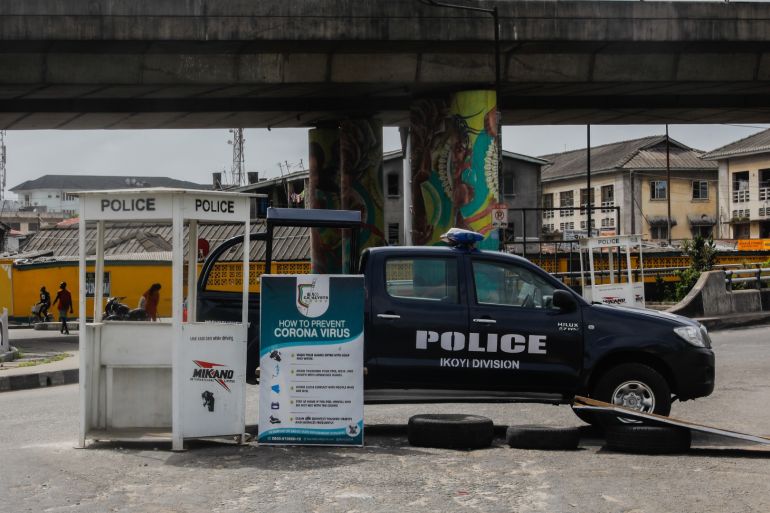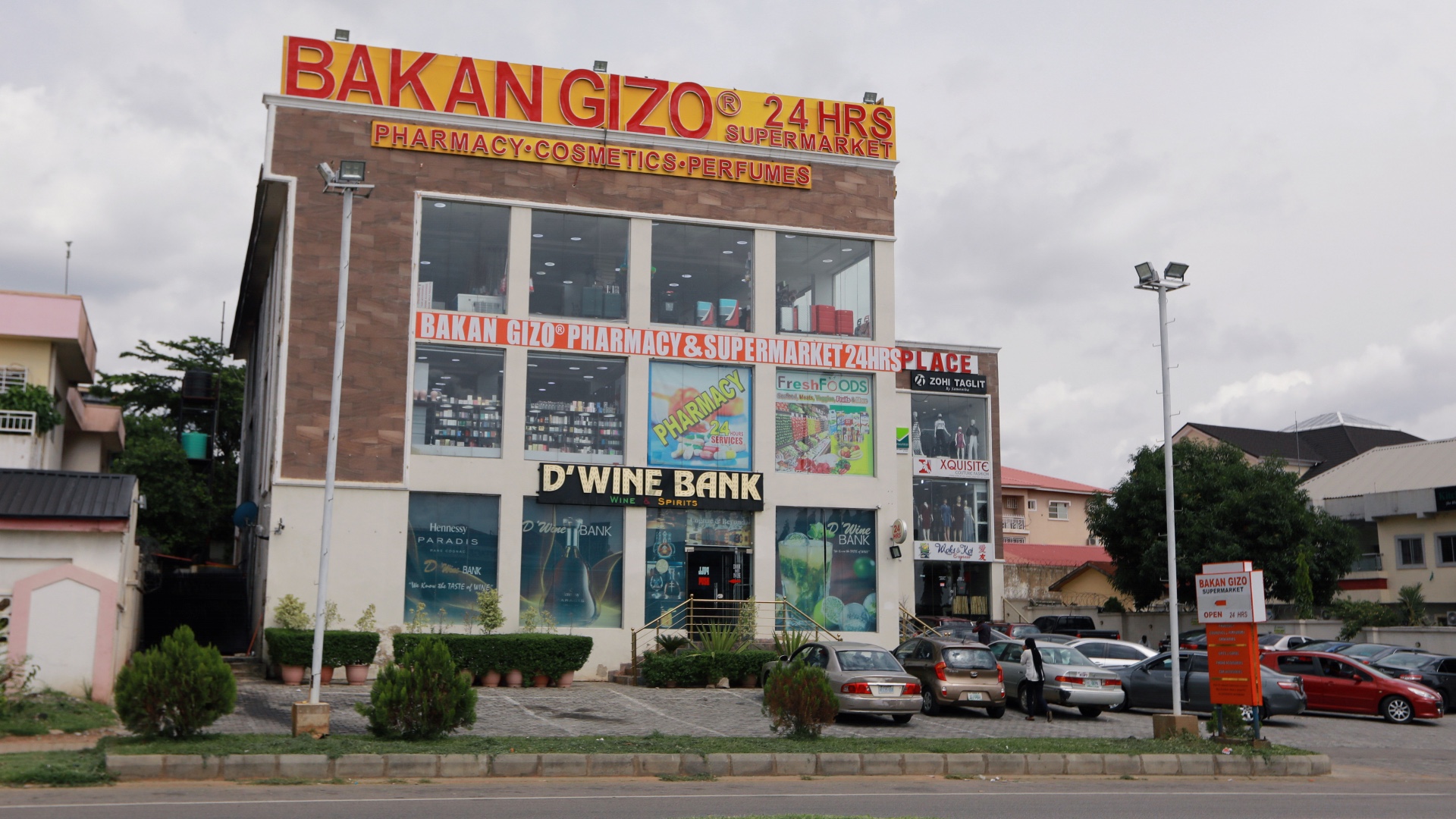Women ‘abused’ by police enforcing COVID-19 rules in Nigeria
Police officers have been accused of abusing the powers given to them during lockdown to ‘assault’ and ‘harass’ women.

Lying on a single-size mattress that covers most of the floor in her family’s one-roomed apartment, Pamela* is silent and withdrawn, barely able to say a word.
Outside, her neighbourhood in the Nigerian city of Bori is quiet – the house of old corrugated zinc sheets is the only building standing on a large plot of land. Inside the room she shares with her mother and two young children, the earth is bare and unplastered, the space scattered with a few essentials. There is no television or other electronics.
Keep reading
list of 4 itemsPalestinian Prisoner’s Day: How many are still in Israeli detention?
‘Mama we’re dying’: Only able to hear her kids in Gaza in their final days
Europe pledges to boost aid to Sudan on unwelcome war anniversary
The 23-year-old has not left the room in weeks, her family says, since she was allegedly raped by a police officer enforcing the government’s coronavirus guidelines.
“She’s terribly traumatised,” Pamela’s older cousin, Fred*, who has been helping take care of the family since the alleged assault, told Al Jazeera. “It has been difficult for her to get a good sleep since the incident.”
On July 28, Pamela was travelling on a public bus on her way to Port Harcourt, the capital of south-central Rivers State, about 45km west of Bori. Upon reaching a checkpoint in the town of Sakpenwa, 25km outside Bori, at 6:30pm, Pamela says four police officers arrested her for not wearing a face mask.
Then, she says, they drove her to a guest house where one of the officers raped her “till dawn” after “threatening to kill” her if she did not cooperate.
“I’ve not been myself and have fainted twice since the rape incident,” said Pamela, whose husband died more than two years ago leaving her alone with their toddler and newborn baby. “Because of my deteriorating health, I had to move in here to live with my mother so I can be cared for.”
Accusations of assault
Pamela is not the only woman in Nigeria to say she has been assaulted by those supposedly enforcing coronavirus prevention measures.
In the town of Nkpor in Nigeria’s southeastern Anambra State, men wearing the yellow vests of a government COVID-19 compliance and enforcement team – a civilian task force mandated to work during the pandemic – were allegedly seen raping a girl they had arrested for not wearing a face mask.
The assault allegedly occurred inside a vehicle the task force used for work, but witnesses said the bus was not inscribed with government insignia. It is unclear whether the alleged perpetrators were actually part of the task force or just posing as members of it.
As angry people surrounded the bus, the alleged perpetrators reportedly absconded from the scene, leaving the vehicle behind. The spokesperson for Anambra State Police Command told the Daily Post, a Nigerian newspaper, that a bus was found abandoned and taken to the police station, while an investigation continues. The police are yet to give an update on the case and no arrests have been made.

More than 10,000 sexual assaults a day
Violence and sexual harassment against women are not uncommon in Nigeria.
The Women At Risk International Foundation reported in 2018 that more than 10,000 women and girls are raped or sexually assaulted every day in the country.
It is not clear how many rapists have been convicted in recent years, but the Nigeria National Bureau of Statistics disclosed that the country’s police reported no convictions for rape in 2017, despite recording 2,279 cases of rape and indecent assault.
Law enforcement officials had faced accusations of rape and assault even before the coronavirus pandemic and resulting lockdown.
In April last year, more than 65 women were arrested during a raid on nightclubs in Nigeria’s capital, Abuja. The women said they were taken to a police station where bribes were demanded in exchange for their release. When a few of the women could not pay the money, they were allegedly raped, with the police officers using empty plastic bags, often used to sell water, instead of condoms.
The case is currently in court. The accused have denied the accusations and the police force has given no updates on the status of the officers involved. The only comment on record is a reaction from Usman Umar, the then-deputy commissioner for Abuja’s police, who told Reuters shortly after the incident occurred that “investigations have commenced” and that anyone found guilty would be “fished out” and punished.

A slow road to justice
In Rivers State, where Pamela says she was assaulted, the police told Al Jazeera that her alleged attacker had been arrested and is still “in custody”.
But Pamela’s family is not convinced that the police are doing enough to get justice for her, saying the investigation has been slow and officials have not been as helpful as they should be.
Immediately after she was assaulted, Pamela says she went to the police to report the rape. The police promised to give her the medical form she needed to complete as part of the report, but did not do so until five days later, her cousin Fred added.
Pamela says she also only visited a clinic a couple of days after the incident occurred, as she did not know that was part of the procedure. She says no one at the police station explained what a rape kit was or that it was something she needed to do.
According to Pamela’s family, when the medical form finally arrived, the police continued to complicate matters.
“The police demanded that [Pamela] submitted a medical report [that shows proof that she was raped] before the case can continue,” explained Fred. “I offered to take the report to them after explaining that she was too sick to get to the police station but they insisted she must submit the report in person.”
When Pamela eventually managed to submit the medical report to the police during the third week of August, she said the police told her she had not needed to submit it in person.
“That’s not the case,” Rivers State Police Command’s public relations officer Nnamdi Omoni told Al Jazeera when asked whether the police insisted that Pamela personally submit her medical report.
“The [rape] matter is still under investigation,” he added in response to further questions.
In her pursuit of justice, Pamela said that she is also relying on evidence from the driver of the commercial bus she was in, who confirmed that police had arrested her, and from operators of the guest house, who also confirmed that she was taken there by police officers on the day she was raped.

Pregnant women, medics harassed
Since May, when the Rivers State government imposed measures to control the spread of the coronavirus, including lockdowns in parts of the state and compulsory wearing of face masks in public places, other reports of police harassment and victimisation have emerged.
A pregnant woman in Port Harcourt miscarried on her way to hospital to see a doctor after policemen detained her for being out during lockdown.
“There is even another pregnant woman who was arrested and detained by policemen for stepping out to buy food,” journalist Kofi Bartels told Al Jazeera.
“The very sad thing about this is that some of those who were arrested by policemen were taken to an isolation centre, where coronavirus patients are kept,” he added, referring to the centre at the Yakubu Gowon Stadium in Port Harcourt.
Last year, Bartels described being beaten and threatened by officers who said they would put him in a prison cell with an inmate who would rape him after he filmed police officers manhandling a boy outside his home in Port Harcourt.
Victims of exploitation by police enforcing coronavirus restriction measures in Rivers State say the harassment cuts across sexes and affects people from diverse groups including the medical sector.
Nurses have allegedly been harassed by policemen who threatened to arrest them for being out during lockdown even though they were working at a local pharmacy, while a pharmacist says he was arrested by policemen who forced him to pay 20,000 naira (about $52) for his release, despite authorisation from the Federal Ministry of Health for pharmacies to operate during lockdown.

F-SARS
Even before the COVID-19 pandemic, police harassment was common in Nigeria, with one particular force the focus of much concern.
The Federal Special Anti-Robbery Squad (F-SARS) has become infamous for allegations of rape, unlawful killings and torture. The death of Hamilton Osahenhen Obazee who was arrested and allegedly tortured to death by F-SARS officers in Edo state in March, triggered several demonstrations to demand the closure of the controversial police unit.
Three people in Port Harcourt told Al Jazeera that personnel from F-SARS have exploited people who they accuse of violating the state’s COVID-19 lockdown or prevention measures. One man said F-SARS officials often arrest people – sometimes up to 100 a day – who fail to wear masks. They reportedly take them to hotels where they demand bribes to the sum of 10,000 (about $26) for releasing them.
“They even go as far as taking their victims to ATM points and ask them to withdraw the money,” said Emenike, a Port Harcourt resident who did not want his full name revealed for fear of retribution. “They let you go once you’ve given them the money,” he added, recounting what happened to two of his close friends.
Activists blame the surge in cases of police abuse on controversial executive orders from the Rivers State governor, Nyesom Wike, that empower officers to arrest people contravening COVID-19 guidelines.
“Under due process, there has to be a legislative provision empowering the governor to make an order but that was not done and the governor went ahead making orders that gave the police the impetus [to act recklessly],” said Courage Nsirimovu, a human rights lawyer at the Institute for Human Rights and Humanitarian Law (IHRHL).
“When the governor announced a dusk to dawn curfew, which we understood to mean from 6pm to 6am, people who were moving about in the morning and evening were arrested and detained for over five days and were only released after a public outcry,” he told Al Jazeera.
As cases of exploitation and abuse by police officers, especially those in Rivers State, continue to be reported, those at the receiving end are tired of the delays on the road to getting justice.
Some, like Pamela, are gathering their strength to demand action.
“I am not going to withdraw my statement to the police that I was raped,” she said. “All I want is justice.”
*Names have been changed to protect identities.